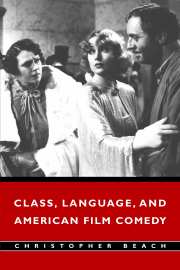Book contents
- Frontmatter
- Contents
- Acknowledgments
- Introduction
- 1 A Troubled Paradise: Utopia and Transgression in Comedies of the Early 1930s
- 2 Working Ladies and Forgotten Men: Class Divisions in Romantic Comedy, 1934–1937
- 3 “The Split-Pea Soup and the Succotash”: Frank Capra's 1930s Comedies and the Subject of Class
- 4 Is Class Necessary?: Preston Sturges and Howard Hawks in the Early 1940s
- 5 Desperately Seeking Status: Class, Gender, and Social Anxiety in Postwar Hollywood Comedy
- 6 Is There a Class in This Text?: Woody Allen and Postmodern Comedy
- 7 Yuppies and Other Strangers: Class Satire and Cultural Clash in Contemporary Film Comedy
- Notes
- Works Cited
- Index
5 - Desperately Seeking Status: Class, Gender, and Social Anxiety in Postwar Hollywood Comedy
Published online by Cambridge University Press: 02 December 2009
- Frontmatter
- Contents
- Acknowledgments
- Introduction
- 1 A Troubled Paradise: Utopia and Transgression in Comedies of the Early 1930s
- 2 Working Ladies and Forgotten Men: Class Divisions in Romantic Comedy, 1934–1937
- 3 “The Split-Pea Soup and the Succotash”: Frank Capra's 1930s Comedies and the Subject of Class
- 4 Is Class Necessary?: Preston Sturges and Howard Hawks in the Early 1940s
- 5 Desperately Seeking Status: Class, Gender, and Social Anxiety in Postwar Hollywood Comedy
- 6 Is There a Class in This Text?: Woody Allen and Postmodern Comedy
- 7 Yuppies and Other Strangers: Class Satire and Cultural Clash in Contemporary Film Comedy
- Notes
- Works Cited
- Index
Summary
A kiss on the hand may be quite continental,
But diamonds are a girl's best friend.
Gentlemen Prefer Blondes
(Howard Hawks)In the screwball comedies of the 1930s and early 1940s, romantic attachments between members of different social classes functioned as allegorical representations of the more general class dynamics of Depression-era America. Through the screwball film, the problems and tensions inherent in an unequal and divided society could be safely explored. In many cases, the fantasy of social reconciliation could be embodied in a romantic union that overcame class barriers and thus demonstrated their fundamental artificiality. Hollywood films of the 1950s and early 1960s, on the other hand, treated the cross-class fantasy quite differently, reflecting fundamental changes in the prevailing social ideology of postwar America. Postwar comedies from Howard Hawks's Gentlemen Prefer Blondes (1953) and Jean Negulesco's How to Marry a Millionaire (1953) to Delbert Mann's That Touch of Mink (1962), for example, differ significantly from their Depression-era counterparts in their treatment of both class dynamics and gender relations. Unlike the 1930s screwball films, in which the man was as likely as the woman to occupy the socially subordinate role, postwar comedies tended to present only a one-dimensional vision: attractive women in search of rich husbands.
In Gentlemen Prefer Blondes, Marilyn Monroe plays Lorelei Lee, a blonde seductress on a mercenary quest for a millionaire. Monroe's performance as Lorelei makes the desire to marry wealth appear so naturalized as to require no concealment or apology.
- Type
- Chapter
- Information
- Class, Language, and American Film Comedy , pp. 125 - 154Publisher: Cambridge University PressPrint publication year: 2002



